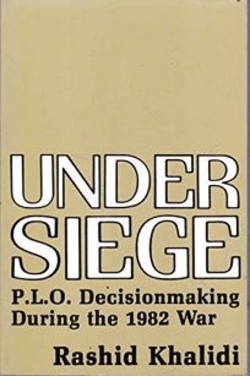It is hard not to suspect the objectivity of a book on the Palestine Liberation Organization that starts by thanking PLO Chairman Yasser Arafat and is dedicated to those killed in 1982 "in defense of the cause of Palestine."
That's how Columbia University associate professor Rashid Khalidi eases us into Under Siege: P.L.O. Decisionmaking During the 1982 War (Columbia University Press, 241 pages, $22.50). Mr. Khalidi's acknowledgments explain that "Permission to utilize the P.L.O. archives ... was generously given by the Chairman of the P.L.O. Executive Committee, Yasir Arafat. To him and to the dedicated individuals working in the office of the Chairman, the P.L.O. archive and the Palestine News Agency (WAFA), who extended every possible assistance to me on three trips to Tunis, I owe deep thanks."
 Such statements suggest that Mr. Arafat, as part of his effort to win recognition from the U.S. government, decided to seek publicity in America for the PLO's version of its 1982 conflict with Israel. Once this decision was made, it was a sensible choice to make the PLO documents available to Mr. Khalidi. For the PLO, he is an author with three great strengths: He offers virtually uncritical support for Mr. Arafat, prestigious academic credentials, and the ability to write for an American audience.
Such statements suggest that Mr. Arafat, as part of his effort to win recognition from the U.S. government, decided to seek publicity in America for the PLO's version of its 1982 conflict with Israel. Once this decision was made, it was a sensible choice to make the PLO documents available to Mr. Khalidi. For the PLO, he is an author with three great strengths: He offers virtually uncritical support for Mr. Arafat, prestigious academic credentials, and the ability to write for an American audience.
True to his potential, Mr. Khalidi has produced a soft polemic that may well advance PLO interests in the U.S.
First, he treats the PLO not as the irredentist movement it is, but as a sovereign government. He refers to "the Palestinian polity," even though no such thing exists. He mentions "the P.L.O. civilian population," as if PLO were synonymous with Palestinian. Such labels promote the illusion Mr. Arafat wishes to spread: that the PLO is already tantamount to a state.
Second, Mr. Khalidi tries to substantiate Mr. Arafat's claim that the PLO really won the 1982 conflict. He does this by denying that the PLO's military defeat at the hands of Israel had any importance. He quotes extensively from material in the PLO archives to support his central thesis that the PLO's slow and painful decision to leave Beirut resulted less from the military pressure exerted by Israel than from the PLO's abandonment by the Lebanese, the Arab states and the Great Powers. He even suggests - against all logic - that Israeli bombings of PLO positions stiffened the organization's resolve not to give in.
 Rashid Khalidi. |
The author also makes use of some wildly misleading analogies. He approvingly quotes from PLO documents that term Beirut the Stalingrad of the Arabs and Israel's Verdun, while himself comparing the siege of Beirut with the siege of Leningrad. Suffice it to say that the Germans lost more than 300,000 soldiers at Verdun. The Israelis lost 88 soldiers in Beirut.
Third, Mr. Khalidi ignores inconvenient facts in his efforts to justify almost every PLO action taken in 1982. He denies that the PLO used the Beirut population as a shield against Israeli attack. He also makes the astonishing claim that Lebanese public opinion had a crucial influence on decisions made by the PLO leadership during the fighting. In contrast, he blames Israel for causing the conflict, violating commitments and perpetrating massacres.
Fourth, Mr. Khalidi suffuses his book with biased terminology. He describes the PLO as "gallant," "scrupulous" and "meticulous." The behavior of Israel, on the other hand, is "deceptive," "ugly" and "ruthless." The PLO always defends itself; Israel always attacks, waging "massive assaults" in a "relentless," "unprovoked," "fierce" or "incessant" manner. Certain phrases are repeated so often that they become incantations. The author refers four times, with the same wording, to Israel's "harsh conditions" for the PLO evacuation of Beirut. Americans get off with being called "presumptuous" and "ludicrous."
Of course, it may be to Mr. Khalidi's credit that he does not hide his partisanship. He calls it "good news" when the PLO eliminates an Israeli beachhead, but "unfortunate" when Syria fails to come to the PLO's aid.
Nonetheless, with its Columbia University Press imprint and academic style, this book is being offered as a work of scholarship. And, as such, it is not enough that Mr. Khalidi makes clear his bias. Scholarship involves an honest search for truth; propaganda starts from a given point of view and seeks to justify it.
Despite the new information offered on the inner workings of the PLO, Under Siege is propaganda parading as scholarship. Its purpose seems to be to improve the image of a terrorist organization. As such, the book is one of the best of its sort. Yasser Arafat should be pleased. But it is sad to see the Columbia University Press allowing its name and reputation to be exploited for such ends.
Feb. 5, 1986 update: Rashid Khalidi replied to this review today, colorfully accusing me of "intellectual terrorism." I shall treasure that.